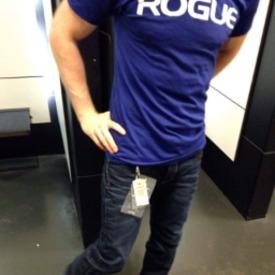Body fat percentage

pdwhitlock
Posts: 81 Member
So.....due to weight lifting and cardio 6 days a week, and since I am about 18 lbs from my goal weight, I've decided to begin to also track my body fat percentage instead of just my weight loss. Is anyone else doing this? Particularly females? Those of you who have tracked your % for a while, Do you have pics to share of your journey and which % was what? I'm at 28.8 right now and the chart that came with the WW scale says that is high and should be between 21 and 28%. I guess I'm trying to set a "goal" here but since I'm new to this kind of measurement, I'm not sure really to go with this.
0
Replies
-
Finally someone who tracks body fat as well! I know you said female but almost could care less what the scale says all I care about is the pinch readings. Use to close to 50% body fat and now I have hit just over 25%0
-
You are definitely on the right track. Considering muscle weighs more than fat, and you lift quite often, it would be disheartening and misleading to use your weight to judge your initial success.
As for a goal, women who are doing the regimen you are should be able to shoot for a goal of 18-22% BF as an intermediate goal. Then advanced would be 15-18%. Below 15% starts to flirt with becoming unhealthy for women IMHO, at least at a casual level.0 -
I will be doing BF% Tracking in the near future as well, as I have hit my scale goal - but my stomach is FAAAAT! I figure it is time to pull out the calipers and start practicing on myself.0
-
I do something called inbody through my gym and have found it to be really helpful--I have gained a pound in the last two months, but I've lost 5 pounds of fat and gained three pounds of muscle and the rest is water--I've gone from 22.8% to 18.7% body fat. I was really bummed by the scale and was starting to not trust the mirror...thinking it was in my head.
Now they can be very inconsistent though so choose the same person for caliper tests or arrange for water displacement or inbody testing. Otherwise just know it can fluctuate 2-4%...0 -
you can have a look at pic below to give you some estimate of the body fat %. Too get proper measurement you would need to use something like body fat caliper etc.

0 -
Finally someone who tracks body fat as well! I know you said female but almost could care less what the scale says all I care about is the pinch readings. Use to close to 50% body fat and now I have hit just over 25%
That's awesome! Glad to see I'm not the only female giving up on the scale and focusing on body fat %. You've done well to get to 25% from nearly 50! I began at 42% and I'm at 28.8.0 -
you can have a look at pic below to give you some estimate of the body fat %. Too get proper measurement you would need to use something like body fat caliper etc.

Thanks so much! This puts it in the scale I needed! I thought the machines were more accurate than the calipers though? But it seems I'm wrong. Where would I find those? (Guess I should google it)
0 -
I do something called inbody through my gym and have found it to be really helpful--I have gained a pound in the last two months, but I've lost 5 pounds of fat and gained three pounds of muscle and the rest is water--I've gone from 22.8% to 18.7% body fat. I was really bummed by the scale and was starting to not trust the mirror...thinking it was in my head.
Now they can be very inconsistent though so choose the same person for caliper tests or arrange for water displacement or inbody testing. Otherwise just know it can fluctuate 2-4%...
Wow! You are awesome...18.7%!
0 -
I went from 35% to ~16%. Once I started tracking body fat, then my whole mentality changed. It's a good way to prepare yourself for strength training and proper nutrition - the scale isn't the only way one can gauge true progress.0
-
I track mine with a scale. While I know it isn't 100% accurate; it is giving me a trend.
The percentages on these pictures are what my scale said the day the pictures were taken.
0 -
Longshot520 wrote: »Considering muscle weighs more than fat
No it does not.
It's more dense. It does not "weigh more." A pound of fat weighs exactly the same as a pound of muscle.
Muscle is more dense. It takes up less space; it has lower volume.
There is no crime in using English words properly.
0 -
tedboosalis7 wrote: »I went from 35% to ~16%. Once I started tracking body fat, then my whole mentality changed. It's a good way to prepare yourself for strength training and proper nutrition - the scale isn't the only way one can gauge true progress.
I totally agree.
There are some pretty impressive photos floating around that show how "weight" doesn't necessarily correspond well to physique. Muscle is more dense, so losing body fat while retaining muscle is ideal. This is why the recommended approach is simple: eat at a calorie deficit, and lift heavy to retain lean muscle mass.
0 -
colors_fade wrote: »tedboosalis7 wrote: »I went from 35% to ~16%. Once I started tracking body fat, then my whole mentality changed. It's a good way to prepare yourself for strength training and proper nutrition - the scale isn't the only way one can gauge true progress.
I totally agree.
There are some pretty impressive photos floating around that show how "weight" doesn't necessarily correspond well to physique. Muscle is more dense, so losing body fat while retaining muscle is ideal. This is why the recommended approach is simple: eat at a calorie deficit, and lift heavy to retain lean muscle mass.
Totally agree - I am past the deficit stage - I need to build muscle - and if fat comes along, the theory would be that it would be mitigated by the muscle increases - so the % really shouldn't budge that much - that's of course making some assumptions.
Agreed man - great post.0 -
tedboosalis7 wrote: »Totally agree - I am past the deficit stage - I need to build muscle - and if fat comes along, the theory would be that it would be mitigated by the muscle increases - so the % really shouldn't budge that much - that's of course making some assumptions.
Agreed man - great post.
Yeah, been doing a lot of reading about that myself; clean bulking vs. bulking. It's a bit of a scary thought to put fat back on after cutting for so long... but I like the idea of having a certain amount of muscle on my frame. Good luck to you man.
0 -
Anyone else use the Withing scale to track bodyfat %? I can change my % to a lower amount just by drinking a quart of water. Which makes sense, so I track it in the morning.
However, I am consistently hovering around 30% and that feels SO discouraging. I have 35 more lbs to lose (and am do far about a third of the way to my overall goal) and my BMI still says "obese." This despite 6 months of solid lifting, cardio, and 45 days of dieting.
How do you guys track your bodyfat %?0 -
I'm very confused regarding body fat % ... My previous gym had a hand held thingie that they fiddled with and then gave me a number. I started at 39% and got down to 28%
Now my new gym has scale type thing that tells me my bodyfat % is sitting at 17%.... Um no way am I 27% bodyfat, I wish I was and I know that worth hard work, heavy lifts and amazingly awesome dedication I might get there eventually. But not yet.
I'm going to ask my gp about bodyfat testing0 -
lols - the old "muscle weighs more than fat" argument rolls on....
From what I've heard you have to use 'calipers' to get an accurate reading but I do mine on scales. I only take the reading as a rough estimate as I think with these things you can never be 100%.
I currently sit at around 13.5% and looking at that picture guide above I'd say that's about right, definitely somewhere between 12 and 15. I am happy with that, though with a bit more dedication I know I could probably do 10 to 12%! I have never cut out any foods, just calorie count and exercise, that's the way to go! 0
0 -
colors_fade wrote: »
Yes, it does. If you compare a similar volume of muscle and fat, the muscle will weigh more, precisely because it is denser.
In the specific context you used, that of comparing mass rather than volume, you're right, they weigh the same. But that's not the only valid comparison, and your very specific context certainly doesn't warrant the accusation that Longshot520 is misusing the language.0 -
I do something called inbody through my gym and have found it to be really helpful--I have gained a pound in the last two months, but I've lost 5 pounds of fat and gained three pounds of muscle and the rest is water--I've gone from 22.8% to 18.7% body fat. I was really bummed by the scale and was starting to not trust the mirror...thinking it was in my head.
Now they can be very inconsistent though so choose the same person for caliper tests or arrange for water displacement or inbody testing. Otherwise just know it can fluctuate 2-4%...
I’d be weary of trusting those numbers. If such high numbers of fat loss and muscle gain were possible contemporaneously, why would people do the bulk / cut process (eat over maintenance to gain muscle, then eat under maintenance to lose fat)? Not to mention that muscle gains are difficult and require a good training regimen i.e. lifting heavy weights.
I’m sure you’ve made great progress, don’t get me wrong, but I’d trust measurements more than weird unreliable machines.
To answer the OPs question, I want to track bf%, but I wish I had a reliable measure. Unfortunately, unless I can get a DEXA scan, the best I can do is maybe look at photos and try to estimate where I am. I think it’s a great goal and much prefer it to exclusively focusing on the scale: it lets you see the bigger picture!0 -
Finally someone who tracks body fat as well! I know you said female but almost could care less what the scale says all I care about is the pinch readings. Use to close to 50% body fat and now I have hit just over 25%
I would track the trend. Pinch readings won't give you accurate readings.
0 -
colors_fade wrote: »
Yes, it does. If you compare a similar volume of muscle and fat, the muscle will weigh more, precisely because it is denser.
In the specific context you used, that of comparing mass rather than volume, you're right, they weigh the same. But that's not the only valid comparison, and your very specific context certainly doesn't warrant the accusation that Longshot520 is misusing the language.
You have got to be kidding me.
Here's the quote: "Considering muscle weighs more than fat"
There's no context there. Just a flat statement that is clearly, scientifically, factually, false.
There is no qualification to that statement.
Defend it all you want. He's using the wrong words.
The only correct statements, without qualifying, is:
a) Muscle is more dense than fat, or Fat is less dense than muscle.
b) Fat takes up more volume than muscle, or muscle takes up less volume than fat.
Density. Volume. These are the words that should be used.
Otherwise, you have to use qualifying language to create context for the comparison. Like, "The same volume of muscle weighs more than fat."
There was no qualification to that statement he made.
Don't perpetuate ignorance.
0 -
I am a scientist and understand what educated trainers mean when they say muscle weighs > fat. The implication is by volume.
I can appreciate precision but generally don't get too upset when people don't speak that way.
In a published paper or magazine article, on the other hand, the precision matters. ..0 -
colors_fade wrote: »Defend it all you want. He's using the wrong words.
No, he's not. If the only valid way of comparing two solids is by mass, then "heavier" is a useless term.Density. Volume. These are the words that should be used.
Volume is implied in his comment. He's talking about equal volumes. You're not. That doesn't mean he was wrong however, it just means that the assumptions and implications were not made explicit, so you're both talking about different things.Otherwise, you have to use qualifying language to create context for the comparison. Like, "The same volume of muscle weighs more than fat."
Yeah, no. Just because there is an assumption doesn't mean it needs to be spelt out every time. On the odd occasion where confusion does occur, it's a simple matter to provide clarity. At least until someone jumps in and accuses someone else of "misusing the language" for the crime of having differing assumptions.There was no qualification to that statement he made.
Yet everyone but you understand the implied qualifications in his statement...Don't perpetuate ignorance.
Rest assured, I won't.
0 -
I do something called inbody through my gym and have found it to be really helpful--I have gained a pound in the last two months, but I've lost 5 pounds of fat and gained three pounds of muscle and the rest is water--I've gone from 22.8% to 18.7% body fat. I was really bummed by the scale and was starting to not trust the mirror...thinking it was in my head.
Now they can be very inconsistent though so choose the same person for caliper tests or arrange for water displacement or inbody testing. Otherwise just know it can fluctuate 2-4%...
Hi Beth, that's fantastic! I'm so glad their is people on here that do track bodyfat% I'm having my bodyfat tested at the gym in the morning and im praying ive lost fat and gained some muscle ive not had it done in a month and ive stalled and not lost in 2 weeks and its so discouraging, can I ask if you was lifting weights or just cardio when you achieved this? I'm only doing cardio atm because I want to see the loss on the scale I really need to get it out my head and stopped being obsessed with scales I just don't get it because when I went to the gym a few years ago and dieted the weight dropped off me but its not this time 0
0 -
Body fat scales, inbody scans, calipers and basically all other methods of determining body fat % are unreliable. They can be right, but they are often (very) wrong. This includes the ones where the salesperson says "99% accurate!!" and the ones that provide you with a professional and scientific looking printout of your results. They are based on estimates that are accurate for groups, but can be wildly inaccurate for the individuals that comprise those groups.
Scales and inbody scans can also be wrong as a measure of progress, because they react differently as your body composition changes.
I think they can still be worthwhile to do (i got a dexa scan last week), but i will never put my faith in them. I think of them as just another opinion, to be weighed against your own estimate looking in the mirror and the guesses you get when you post a pic on a forum.
I think your idea of measuring progress based on body fat % is a great one in theory though 0
0 -
There is no crime in letting them speak like a average human being. The same volume of fat and muscle is what their talking about.colors_fade wrote: »Longshot520 wrote: »Considering muscle weighs more than fat
No it does not.
It's more dense. It does not "weigh more." A pound of fat weighs exactly the same as a pound of muscle.
Muscle is more dense. It takes up less space; it has lower volume.
There is no crime in using English words properly.
It's okay. If someone doesn't understand. It'll be cleared up.
Retaining muscle is nice. I learned you still had to lift the hard way. Thankfully I figured it out early on.colors_fade wrote: »tedboosalis7 wrote: »I went from 35% to ~16%. Once I started tracking body fat, then my whole mentality changed. It's a good way to prepare yourself for strength training and proper nutrition - the scale isn't the only way one can gauge true progress.
I totally agree.
There are some pretty impressive photos floating around that show how "weight" doesn't necessarily correspond well to physique. Muscle is more dense, so losing body fat while retaining muscle is ideal. This is why the recommended approach is simple: eat at a calorie deficit, and lift heavy to retain lean muscle mass.
Those pictures say mine is about accurate. Wouldn't say completely. Down from 28% body fat to 27%.
I want 20%. Then we'll see how I look. Then I'll decide if I'll go lower. (Subject to change IF needed.)
By my measurements.
And I agree with the poster who said they are not always reliable. I used one different than my preferred one and it said 50% body fat. Umm that does not match the photos anywhere. I can see two abs when laying.
And I can't pinch much more than my stomach to get a bunch of fat. (And even then it isn't too much.) More than I like though.
So my advice is make sure you compare and use one that seems accurate as possible to you. You have to be honest with yourself.
0 -
colors_fade wrote: »
No it does not.
It's more dense. It does not "weigh more." A pound of fat weighs exactly the same as a pound of muscle.
Muscle is more dense. It takes up less space; it has lower volume.
There is no crime in using English words properly.
There is no crime in letting them speak like a average human being. The same volume of fat and muscle is what their talking about.
It is refreshing to find someone who understands and can communicate without picking nits.0 -
colors_fade wrote: »colors_fade wrote: »
Yes, it does. If you compare a similar volume of muscle and fat, the muscle will weigh more, precisely because it is denser.
In the specific context you used, that of comparing mass rather than volume, you're right, they weigh the same. But that's not the only valid comparison, and your very specific context certainly doesn't warrant the accusation that Longshot520 is misusing the language.
The only correct statements, without qualifying, is:
a) Muscle is more dense than fat, or Fat is less dense than muscle.
b) Fat takes up more volume than muscle, or muscle takes up less volume than fat.
Density. Volume. These are the words that should be used
By your own argument, (b) is not correct because a cubic inch of fat takes up the same volume as a cubic inch of muscle. Since density is defined by both mass and volume, you have to use both of them to be completely accurate. You would need a qualifier for that statement.
If you're going to call people out for using the English language improperly , you should be sure you're using it correctly yourself.
0
This discussion has been closed.
Categories
- All Categories
- 1.4M Health, Wellness and Goals
- 398.2K Introduce Yourself
- 44.7K Getting Started
- 261K Health and Weight Loss
- 176.4K Food and Nutrition
- 47.7K Recipes
- 233K Fitness and Exercise
- 463 Sleep, Mindfulness and Overall Wellness
- 6.5K Goal: Maintaining Weight
- 8.7K Goal: Gaining Weight and Body Building
- 153.5K Motivation and Support
- 8.4K Challenges
- 1.4K Debate Club
- 96.5K Chit-Chat
- 2.6K Fun and Games
- 4.8K MyFitnessPal Information
- 13 News and Announcements
- 21 MyFitnessPal Academy
- 1.6K Feature Suggestions and Ideas
- 3.2K MyFitnessPal Tech Support Questions

















